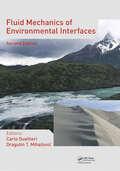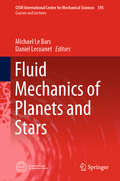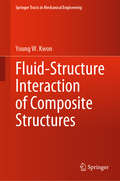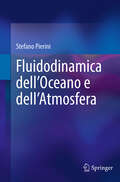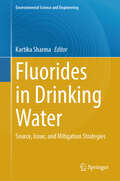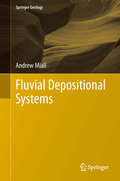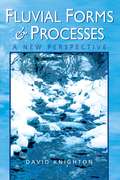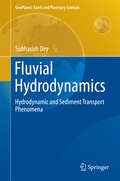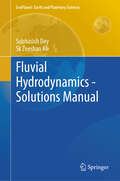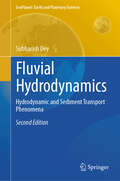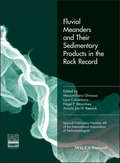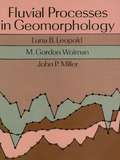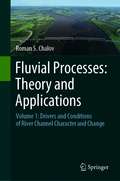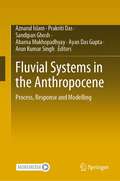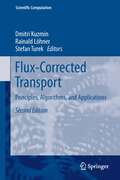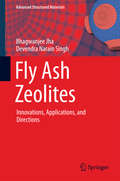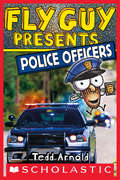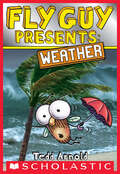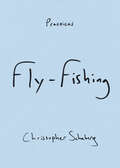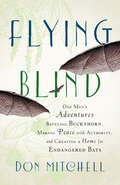- Table View
- List View
Fluid Mechanics Fundamentals of Hydrocyclones and Its Applications in the Mining Industry (Fluid Mechanics and Its Applications #126)
by Fernando Concha A. Juan Luis Bouso A.This book covers topics on engineering science, technology and applications of the classification of particles in liquids suspensions in hydrocyclones. It is divided into 12 chapters starting with the introduction of the hydrocyclone to the mining industry and its several applications of classification, followed by the fundamentals of classification. A special chapter on the fundamentals of sedimentation as the mechanism of the hydrocyclone classification is given. The authors also cover the fundamentals hydrodynamics of solid–fluid interaction with application to the fluids and suspensions flow of in circular pipelines and discusses the flow pattern in hydrocyclones from a fluid dynamics point of view. The physical design, the empirical, phenomenological and numerical hydrocyclone models are presented. The two last chapters deal with the applications of hydrocyclones system design and instrumentation study cases of application in hydrocyclones to the mining industry. Several parts of this book are the result of the work of their research and professional groups from the university and industry.
Fluid Mechanics and Hydraulics: Proceedings of 26th International Conference on Hydraulics, Water Resources and Coastal Engineering (HYDRO 2021) (Lecture Notes in Civil Engineering #314)
by Vijay P. Singh P. V. Timbadiya P. L. Patel Bandita BarmanThis book comprises the proceedings of the 26th International Conference on Hydraulics, Water Resources and Coastal Engineering (HYDRO 2021) focusing on broad spectrum of emerging opportunities and challenges in the field of fluid mechanics and hydraulics. It covers a range of topics, including, but not limited to, experimental and computational fluid mechanics, sediment dynamics, environmental impact assessment of water resources projects, environmental flows, pollutant transport, etc. Presenting recent advances in the form of illustrations, tables, and text, it offers readers insights for their own research. In addition, the book addresses fundamental concepts and studies in the field of flood forecasting and hydraulic structures, making it a valuable resource for both beginners and researchers wanting to further their understanding of hydraulics, water resources and coastal engineering.
Fluid Mechanics of Environmental Interfaces
by Sajjan G. ShivaEnvironmental Fluid Mechanics (EFM) studies the motion of air and water at several different scales, the fate and transport of species carried along by these fluids, and the interactions among those flows and geological, biological, and engineered systems. EFM emerged some decades ago as a response to the need for tools to study problems of flow an
Fluid Mechanics of Planets and Stars (CISM International Centre for Mechanical Sciences #595)
by Michael Le Bars Daniel LecoanetThis book explores the dynamics of planetary and stellar fluid layers, including atmospheres, oceans, iron cores, and convective and radiative zones in stars, describing the different theoretical, computational and experimental methods used to study these problems in fluid mechanics, including the advantages and limitations of each method for different problems. This scientific domain is by nature interdisciplinary and multi-method, but while much effort has been devoted to solving open questions within the various fields of mechanics, applied mathematics, physics, earth sciences and astrophysics, and while much progress has been made within each domain using theoretical, numerical and experimental approaches, cross-fertilizations have remained marginal. Going beyond the state of the art, the book provides readers with a global introduction and an up-to-date overview of relevant studies, fully addressing the wide range of disciplines and methods involved. The content builds on the CISM course “Fluid mechanics of planets and stars”, held in April 2018, which was part of the research project FLUDYCO, supported by the European Research Council (ERC) under the European Union's Horizon 2020 research and innovation program.
Fluid-Induced Seismicity
by Serge A. ShapiroThe characterisation of fluid transport properties of rocks is one of the most important, yet difficult, challenges of reservoir geophysics, but is essential for optimal development of hydrocarbon and geothermal reservoirs. This book provides a quantitative introduction to the underlying physics, application, interpretation, and hazard aspects of fluid-induced seismicity with a particular focus on its spatio-temporal dynamics. It presents many real data examples of microseismic monitoring of hydraulic fracturing at hydrocarbon fields and of stimulations of enhanced geothermal systems. The author also covers introductory aspects of linear elasticity and poroelasticity theory, as well as elements of seismic rock physics and mechanics of earthquakes, enabling readers to develop a comprehensive understanding of the field. Fluid-Induced Seismicity is a valuable reference for researchers and graduate students working in the fields of geophysics, geology, geomechanics and petrophysics, and a practical guide for petroleum geoscientists and engineers working in the energy industry.
Fluid-Structure Interaction and Biomedical Applications
by Giovanni P. Galdi Tomáš Bodnár Šárka NečasováThis book presents, in a methodical way, updated and comprehensive descriptions and analyses of some of the most relevant problems in the context of fluid-structure interaction (FSI). Generally speaking, FSI is among the most popular and intriguing problems in applied sciences and includes industrial as well as biological applications. Various fundamental aspects of FSI are addressed from different perspectives, with a focus on biomedical applications. More specifically, the book presents a mathematical analysis of basic questions like the well-posedness of the relevant initial and boundary value problems, as well as the modeling and the numerical simulation of a number of fundamental phenomena related to human biology. These latter research topics include blood flow in arteries and veins, blood coagulation and speech modeling. We believe that the variety of the topics discussed, along with the different approaches used to address and solve the corresponding problems, will help readers to develop a more holistic view of the latest findings on the subject, and of the relevant open questions. For the same reason we expect the book to become a trusted companion for researchers from diverse disciplines, such as mathematics, physics, mathematical biology, bioengineering and medicine.
Fluid-Structure Interaction of Composite Structures (Springer Tracts in Mechanical Engineering)
by Young W. KwonThis is the first book presenting dynamic responses and failure of polymer composite structures as they interact with internal and/or external fluid media. It summarizes authoritative research carried out by the author in the past decade on various aspects of Fluid-Structure Interaction (FSI) to present important effects of FSI on composite structures. The topics include impact loading on composite structures with air-back, water-back, or containing water; FSI effects on frequencies, mode shapes, and modal curvatures; cyclic loading for fatigue failure with FSI; coupling of independent composite structures by fluid media; and moving composite structures in water. Numerical techniques for FSI are also presented. Research was conducted both experimentally and numerically to complement each other. The book offers a timely, comprehensive information to fluid-structure interaction of composite structures for students, researchers or practicing engineers.
Fluidodinamica dell’Oceano e dell’Atmosfera
by Stefano PieriniQuesto testo esplora la Fluidodinamica dell'Oceano e dell'Atmosfera ed è concepito specificamente per corsi di laurea di primo livello (B.Sc., livello upper undergraduate). Sebbene la fluidodinamica sia ampiamente trattata in vari corsi di Ingegneria - come l’Ingegneria Meccanica, Civile, Idraulica, Navale e Aerospaziale - esiste una carenza di testi universitari che affrontino l'argomento con un approccio più aderente alla Fisica e che includano specifici aspetti riguardanti l’oceano e l’atmosfera. Questo libro nasce con l’obiettivo di colmare tale lacuna. Nella prima parte, dopo un'introduzione ai fondamenti della fluidodinamica incompressibile - evitando di soffermarsi su aspetti di interesse puramente ingegneristico - viene trattato in dettaglio un tema di grande rilevanza meteo-oceanografica: le onde di gravità, sia superficiali sia interne. La seconda parte è interamente dedicata alla fluidodinamica in sistemi di riferimento rotanti, con un focus sugli aspetti basilari della meteorologia e dell’oceanografia dinamica, nei quali la forza apparente di Coriolis gioca un ruolo cruciale. Questo testo si propone come una preziosa risorsa per studenti e ricercatori che desiderino acquisire le basi della fluidodinamica applicata a contesti oceanici e atmosferici, offrendo una prospettiva fisica dettagliata e rigorosa.
Fluorides in Drinking Water: Source, Issue, and Mitigation Strategies (Environmental Science and Engineering)
by Kartika SharmaThis book brings together a diverse group of researchers to address the challenges posed by global mass poisoning caused by fluoride contamination of water bodies. The book sheds light on this global environmental issue and proposes solutions to contamination through multi-disciplinary approaches. Water is considered a vital resource because it is necessary for all aspects of human and ecosystem survival. However, due to natural processes and anthropogenic activities, various pollutants have been added to the water system. Among these, fluoride and fluorocarbons (fluorinated carbon) are some of the most serious pollutants. It occurs naturally in several minerals and in trace quantities in water. Due to its characteristics, it is very widely used in medicine, dentistry, industry, or agriculture. Fluoride content in drinking water is very important from health point of view as because it has long been recognized as a constituents of bones, teeth, soft tissues, and body fluids. On the other hand, its universality possesses a real threat to the human body in the form of acute and chronic poisoning. There are reports that excessive fluoride intake for extended period causes adverse effects of health such as fluorosis, cancer, arthritis, and other diseases. It has also been observed that fluoride in excess affects human intelligence, especially in children, who are most susceptible to early fluoride toxicity. This book contains three sections. The first section describes the different sources and distribution of fluoride in water ecosystem. The second section explains the health risks linked to fluoride poisoning. The third section addresses sustainable fluoride toxicity mitigation strategies and the potential applications of recent biological technology in providing solutions. This book is a valuable resource to students, academics, researchers, and environmental professionals doing fieldwork on fluoride and fluorocarbons contamination throughout the world.
Fluvial Depositional Systems
by Andrew MiallThe book summarizes methods of mapping and interpretation of fluvial depositional systems, with a detailed treatment of the tectonic, climatic and eustatic controls on fluvial depositional processes. It focuses on the preserved, ancient depositional record and emphasizes large-scale (basin-scale) depositional processes. Tectonic and climatic controls of fluvial sedimentation and the effects of base-level change on sequence architecture are discussed. Profusely illustrated and with an extensive reference to the recent literature, this book will be welcomed by the student and professional geologist alike.
Fluvial Depositional Systems: Continuing Education Course Notes 20 (Springer Geology)
by Andrew MiallThis book is intended to complement the author's 1996 book "The geology of fluvial deposits", not to replace it.The book summarizes methods of mapping and interpretation of fluvial depositional systems, with a detailed treatment of the tectonic, climatic and eustatic controls on fluvial depositional processes. It focuses on the preserved, ancient depositional record and emphasizes large-scale (basin-scale) depositional processes. Tectonic and climatic controls of fluvial sedimentation and the effects of base-level change on sequence architecture are discussed. Profusely illustrated and with an extensive reference to the recent literature, this book will be welcomed by the student and professional geologist alike.
Fluvial Forms and Processes: A New Perspective
by David KnightonDavid Knighton's best-selling book looks at the wide range of forms developed by natural rivers and the processes responsible for that development. The book combines empirical and theoretical approaches, and provides a critical assessment of the many schools of thought which have emerged for dealing with adjustment in the fluvial system. It is fully illustrated throughout by a superb range of figures, photographs and tables.Starting with the network scale, the book examines the interaction of hillslopes, drainage networks and channels, and goes on to considerations of catchment hydrology and catchment denudation. Fluvial processes are analysed in detail, from the mechanics of flow to sediment transport and deposition. Detailing the major components of river channels, the book examines the nature of river adjustment, particularly with respect to equilibrium concepts, and concludes with a look at channel changes through time, affected by flood discharges, climatic change and human activities.
Fluvial Hydrodynamics
by Subhasish DeyThe state-of-the-art in fluvial hydrodynamics can be examined only through a careful exploration of the theoretical development and applied engineering technology. The book is primarily focused, since most up-to-date research findings in the field are presented, on the research aspects that involve a comprehensive knowledge of sediment dynamics in turbulent flows. It begins with the fundamentals of hydrodynamics and particle motion followed by turbulence characteristics related to sediment motion. Then, the sediment dynamics is analysed from a classical perspective by applying the mean bed shear approach and additionally incorporating a statistical description for the role of turbulence. The work finally examines the local scour problems at hydraulic structures and scale models. It is intended to design as a course textbook in graduate / research level and a guide for the field engineers as well, keeping up with modern technological developments. Therefore, as a simple prerequisite, the background of the readers should have a basic knowledge in hydraulics in undergraduate level and an understanding of fundamentals of calculus.
Fluvial Hydrodynamics - Solutions Manual (GeoPlanet: Earth and Planetary Sciences)
by Subhasish Dey Sk Zeeshan AliThe book provides the solutions to the unsolved problems given in the book titled Fluvial Hydrodynamics: Hydrodynamic and Sediment Transport Phenomena. The manual includes the solutions to the problems on Chapters 1 to 11, including the properties of fluid and sediment, hydrodynamic principles, turbulence in open-channel flows, sediment threshold, bedload transport, suspended-load transport, total-load transport, bedforms, river processes, scour, and dimensional analysis and similitude. It, therefore, serves as a guide for graduate students, researchers, and field engineers to solve the problems in fluvial hydrodynamics. As a prerequisite, the background of the readers should have a knowledge in fluvial hydrodynamics described in the said book and an understanding of fundamentals of calculus.
Fluvial Hydrodynamics: Hydrodynamic and Sediment Transport Phenomena (GeoPlanet: Earth and Planetary Sciences)
by Subhasish DeyThis revised second edition of the book presents an improvement of the original version in terms of recent research, corrections, and outline. The state of the art in fluvial hydrodynamics can be examined only through a careful exploration of the theoretical development and applied engineering technology. This second, updated edition focuses, since most up-to-date research findings in the field are presented, on the research aspects that involve a comprehensive knowledge of sediment dynamics in turbulent flows. It begins with the fundamentals of hydrodynamics and particle motion followed by turbulence characteristics related to sediment motion. Sediment dynamics are described from a classical perspective by applying the mean bed shear approach and additionally incorporating a statistical description for the role of turbulence. It is intended to design as a course textbook in graduate / research level and a guide for the field engineers as well, keeping up with modern technological developments. One of the most important additions is that at the end of each chapter, varieties of problems were given. Therefore, as a simple prerequisite, the background of the readers should have a basic knowledge in hydraulics in undergraduate level and an understanding of fundamentals of calculus.
Fluvial Meanders and Their Sedimentary Products in the Rock Record (International Association Of Sedimentologists Series)
by Massimiliano Ghinassi Luca Colombera Nigel P. Mountney Arnold Jan H. Reesink Mark BatemanThe sinuous form and peculiar evolution of meandering rivers has long captured the imagination of people. Today, meandering rivers exist in some of the most densely populated areas in the World, where they provide environmental and economic wealth and opportunities, as well as posing hazards. Through geological time, the ancestors of these modern meanders built deposits that are now host to mineral resources, groundwater, and hydrocarbons. This Special Publication illustrates the breadth of current research on meandering rivers and their deposits. The collection of research papers demonstrates the state of science on fluvial process–product relationships. The articles cover fundamental and applied studies of both modern and ancient rivers, are based on state-of-the-art technology, include complementary philosophical approaches, and span a wide range of spatial and temporal scales. This book includes some of the most recent advances in the study of the morphodynamics and sedimentology of meandering rivers, and is an important resource for those who want to investigate fluvial systems and their deposits.
Fluvial Processes in Geomorphology (Dover Earth Science)
by Luna B. Leopold John P. Miller M. Gordon WolmanThis excellent text is a pioneering work in the study of landform development under processes associated with running water. Its primary emphasis is on subjects that were the focus of the authors' studies in both field and laboratory. Part I deals with the process of change in the evolving landscape. Part II explores process and form, and Part III, the effects of time.In Part I, the relation of geomorphology to field problems is analyzed in studies of a mountain block in a semiarid climate, a meandering river cut into bedrock, and benches along a sea coast. Part Two contains studies of weathering, climate, and such denudational processes as flooding and erosion. Here, too, are examinations of the drainage basin as a geomorphic unit, water and sediment in channels, channel form and process, and hillslope characteristics and processes.In Part III, the authors cover geochronology, drainage pattern evolution, channel changes with time, and the evolution of hillslopes. Two appendixes will help readers convert units and equivalents, and identify symbols and nomenclature. 1964 edition.
Fluvial Processes: Volume 1: Drivers and Conditions of River Channel Character and Change
by Roman S. ChalovThis book presents an overview of the fluvial processes theory developed in the former USSR at Lomonosov Moscow State University for the last 50 years, following the famous manuscript by Professor Makkaveev in 1955. Even being published solely in the Russian language, the theory and the author of the book, Prof. Roman Chalov, are well known in the World. This book consolidates for the first time in English, Chalov's work for the global audience.The book demonstrates how principles from fluvial geomorphology and hydrology are used to develop an ecosystem approach to river analysis and management. Despite a strong tradition in fluvial geomorphology work in the USSR, unfortunately, little has been made of insights provided on the international stage. The fluvial processes theory accepted in USSR was somewhat isolated during the long period of development from the English-language literature. The studied rivers are mostly located in Northern Eurasia and much different from those described in classical English-language works. Chalov allows the readers to interconnect two Worlds in Geomorphology, building bridges between the classical international geomorphology and the equally in-depth and thorough but isolated research in the USSR.
Fluvial Systems in the Anthropocene: Process, Response and Modelling
by Sandipan Ghosh Aznarul Islam Arun Kumar Singh Prakriti Das Abarna Mukhopadhyay Ayan Das GuptaThis book addresses the various factors affecting fluvial systems, the processes governing them, system responses arising from human-nature interventions, and geospatial and geo-ecological modeling to understand system behaviour better and restore degraded ecosystems around the globe. Thanks to their hydrological and agro-ecological advantages, humans have settled along riverbanks since the dawn of civilization. Thus, the ancient "ecumene" (settlements) were located near major rivers worldwide. This legacy of river-based civilizations continues to this day in many forms. However, in the course of the 'Anthropocene' era, countless fluvial systems have been altered by human interventions in the form of large-scale dams and barrages, changes in land use and land cover, road-stream crossings, mining of sand and gravel, mushrooming of brickfield, expansion of modern agriculture, industrial growth, and urbanization. Thus, the present-day development pattern threatens fluvial systems, especially riverine morphology and ecosystems. In brief, human-induced morphological changes, water pollution, eutrophication, and related damages to aquatic organisms are the major threats to fluvial systems. Thus, maintaining the 'environmental flow' of the world's major rivers to preserve the proper functioning of riverine ecosystems and promote sustainable development is a global challenge.
Flux-Corrected Transport
by Dmitri Kuzmin Rainald Löhner Stefan TurekAddressing students and researchers as well as Computational Fluid Dynamics practitioners, this book is the most comprehensive review of high-resolution schemes based on the principle of Flux-Corrected Transport (FCT). The foreword by J.P. Boris and historical note by D.L. Book describe the development of the classical FCT methodology for convection-dominated transport problems, while the design philosophy behind modern FCT schemes is explained by S.T. Zalesak. The subsequent chapters present various improvements and generalizations proposed over the past three decades. In this new edition, recent results are integrated into existing chapters in order to describe significant advances since the publication of the first edition. Also, 3 new chapters were added in order to cover the following topics: algebraic flux correction for finite elements, iterative and linearized FCT schemes, TVD-like flux limiters, acceleration of explicit and implicit solvers, mesh adaptation, failsafe limiting for systems of conservation laws, flux-corrected interpolation (remapping), positivity preservation in RANS turbulence models, and the use of FCT as an implicit subgrid scale model for large eddy simulations.
Fly Ash Zeolites
by Bhagwanjee Jha Devendra Narain SinghThis book presents a thorough review of the state-of-knowledge and recent innovations in the synthesis of pure and improved grades of fly ash zeolites (FAZ). Addressing improvements to conventional methods, it also showcases a novel technique for the synthesis of high cation exchangers from fly ash and detailed characterization techniques for the products obtained. In addition, it examines in detail various areas of specific applications of fly ash zeolites. Over the years, several methods such as hydrothermal, fusion prior to hydrothermal, microwave assisted hydrothermal and molten salt techniques for producing FAZ have been developed. However, one-step and two-step reactions between the fly ash and alkali usually generate alkaline wastes that may cause environmental contamination. In addition, the separation of FAZ from the partially activated fly ash (the impurities) remains a major concern for researchers and industrialists alike. In view of these challenges, this book presents a novel technique for three-step activation (TSA), which focuses on recycling the fly ash-NaOH-water reaction by-products until zeolitic residue is formed. The FAZ (the final residue after third step reactions) synthesized in this manner exhibits exceptionally high cation exchange capacity, specific surface area and pore area. This book offers a comprehensive compendium of reading material on fly ash and its recycled product, the zeolites. Students at both undergraduate and graduate levels, researchers, and practicing engineers will all find this book to be a valuable guide in their respective fields.
Fly Guy Presents: Police Officers (Scholastic Reader, Level 2 #11)
by Tedd ArnoldFly Guy is buzzing over to the police station to learn all about police officers!Fly Guy and Buzz are visiting a police station on their latest field trip. They will learn all about police officers: job duties and responsibilities, police dogs, uniforms, police cars, community policing, police stations, police chiefs, police academies, detectives, and even how and when to use 9-1-1. There's so much to learn about these important community helpers! Award-winning author-illustrator Tedd Arnold brings nonfiction to life for beginning readers. There are humorous illustrations and engaging photographs throughout. The front cover features eye-catching holographic foil!
Fly Guy Presents: Weather (Scholastic Reader, Level 2)
by Tedd ArnoldLearn all about weather with Fly Guy!It's time for a field trip! Fly Guy and Buzz are going to a weather station to learn all about weather. With straightforward text, humorous asides, and kid-friendly full-bleed photographs throughout, young readers will love learning about tornadoes, hurricanes, blizzards, and much more! Award-winning author/illustrator Tedd Arnold really brings nonfiction to life for beginning readers! And this book has eye-catching holographic foil on the front cover!
Fly-Fishing (Practices)
by Christopher SchabergIn Fly-Fishing, Christopher Schaberg ponders his lifetime pursuit of the widely mythologized art of fly-fishing. From the Michigan lakeshore where he learned to fish to casting flies in a New Orleans bayou, Schaberg sketches landscapes and fish habitats and shows how fly-fishing allows him to think about coexisting with other species. It offers Schaberg a much-needed source of humility, social isolation, connection with nature, and a reminder of environmental degradation. Rather than centering fishing on trophies, conquest, and travel, he advocates for a “small-fishing” that values catching the diminutive fish near one’s home. Introspective and personal, Fly-Fishing demonstrates how Schaberg’s obsession indelibly shapes how he understands and lives in the wider world.
Flying Blind: One Man's Adventures Battling Buckthorn, Making Peace with Authority, and Creating a Home for Endangered Bats
by Don MitchellWhen Middlebury writing professor Don Mitchell was approached by a biologist with the Vermont Fish and Wildlife Department about tracking endangered Indiana bats on his 150-acre farm in Vermont's picturesque Champlain Valley, Mitchell's relationship with bats—and with government—could be characterized as distrustful, at best.But the flying rats, as Mitchell initially thinks of them, launched him on a series of "improvements" to his land that would provide a more welcoming habitat for the bats—and a modest tax break for himself and his family. Whether persuading his neighbors to join him on a "silent meditation," pulling invasive garlic mustard out of the ground by hand, navigating the tacit ground rules of buying an ATV off Craigslist, or leaving just enough honeysuckle to give government inspectors "something to find," Mitchell&’s tale is as profound as it is funny—a journey that changes Mitchell&’s relationship with Chiroptera, the land, and, ultimately, his understanding of his own past.Ruminating on the nature of authority, the purview of the state, and the value of inhabiting one&’s niche—Mitchell reveals much about our inner and outer landscape, in this perfectly paced and skilled story of place.


